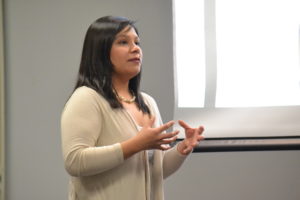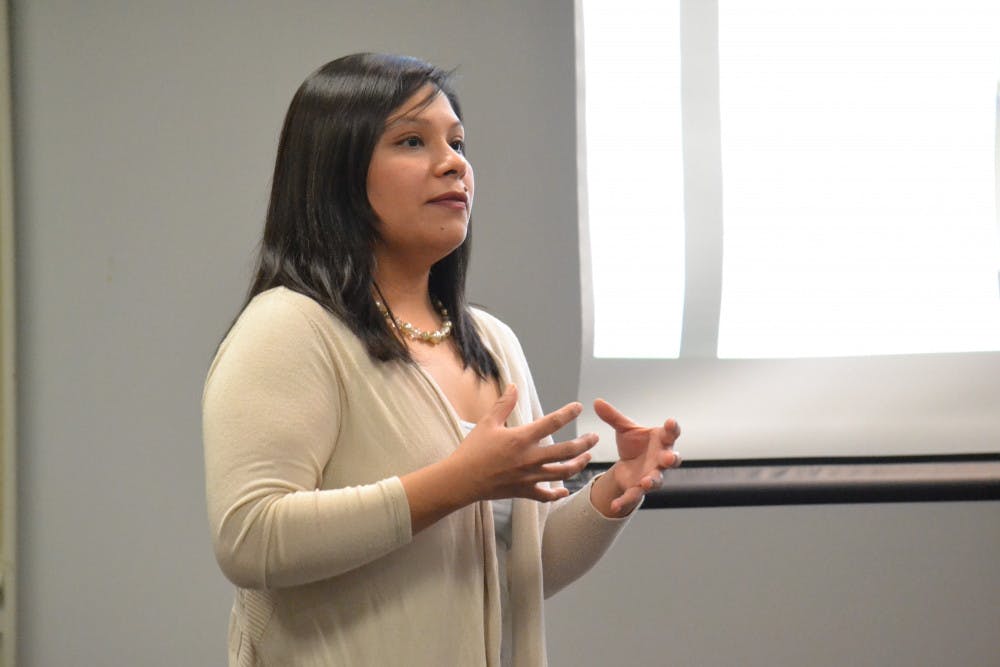By Elise Schoening
Staff Writer
Most of the seats in the Business Building Lounge were already filled on Tuesday, March 21, when a Rutgers-Newark Law School student stepped to the front of the room to share her story.
Marisol Conde-Hernandez has made quite the name for herself. While in college, Conde-Hernandez founded the first undocumented, youth-led immigrant rights activism group in New Jersey. This May, she will become the first undocumented immigrant to graduate from a New Jersey law school.
The rising immigration activist shared her wisdom, as well as words of advice with students as part of the College’s series “Activism 101 and 102.”
In her keynote address, Conde-Hernandez opened up about her past and the personal struggles that came with growing up as an undocumented immigrant in a mixed-status family.

“I use my family as an example of the reality of immigrant families, in that it’s not composed of all undocumented people or citizens,” Conde-Hernandez said. “This is what a mixed-status family looks like. This is what an immigrant family looks like.”
From a young age, Conde-Hernandez understood that her family was different from that of her peers. At 10 years old, she was urged to apply for a scholarship program at a better school, but her illegal status made the seemingly simple task of filling out the application impossible.
“When I looked at the application — and I was always the one to fill out all the applications because I’m the one who spoke English — I noticed that it asked for a Social Security number, and I just turned the paper away,” Conde-Hernandez said.
She described a childhood tainted with the knowledge that she did not have a Social Security number and would, therefore, limit her opportunities in life.
However, the DREAM Act, a legislative bill introduced in 2001, aimed to create a path for Conde-Hernandez and other undocumented immigrants to obtain a green card and pursue higher education in the United States.
Conde-Hernandez still remembers the pivotal moment of hearing about the bill.
“I was sitting at home watching the news in eighth grade when I heard about the DREAM Act,” Conde-Hernandez said. “I think that’s really what started shaping my mind as an advocate. I learned that it’s beyond me. There’s other people like me because if there weren’t, these legislatures wouldn’t have drafted a bill to help them.”
Efforts to ratify the DREAM Act have repeatedly failed to pass through Congress. Nevertheless, the notion that undocumented immigrants deserve equal rights and opportunities has stuck with Conde-Hernandez and propelled her toward a life of activism.
“I didn’t intend to be an advocate for immigrant population,” Conde-Hernandez said. “It just turned out to be that way. I saw a need and tried to fill that need.”
Conde-Hernandez urged students of the College to find their voice and rally behind issues of interest. She conceded that turning activism into an actual career isn’t easy. Most people don’t get paid for the activism they do, but this doesn’t dilute the importance or necessity of such work, according to Conde-Hernandez.
“If we all spoke up the way that I’ve spoken up, we would actually have legislatives and executives who listened and were held responsible by constitutes and citizens,” Conde-Hernandez said. “They have been in control of the government for decades because we have been passive. We can’t be passive.”
Conde-Hernandez challenged the students seated before her to internalize her message and create change in their own communities.
“You don’t have to have a college education to have a gut feeling about the world and to learn about the world,” Conde-Hernandez said. “But because you all are in college, how are you going to take advantage of the wealth of information you have available to you to further the causes that you care about?”
Senior international studies and Arabic double major Alessandra Testa left the event inspired. Conde-Hernandez’s words resonated and pushed her to reevaluate her own actions.
“I think it’s so easy to get trapped in the TCNJ bubble, view current events in a detached way and disassociate with the ‘real world,’” Testa said. “This was a good lecture to have on campus. It forced me to think about how I can use my education to make practical, effective change happen.”







